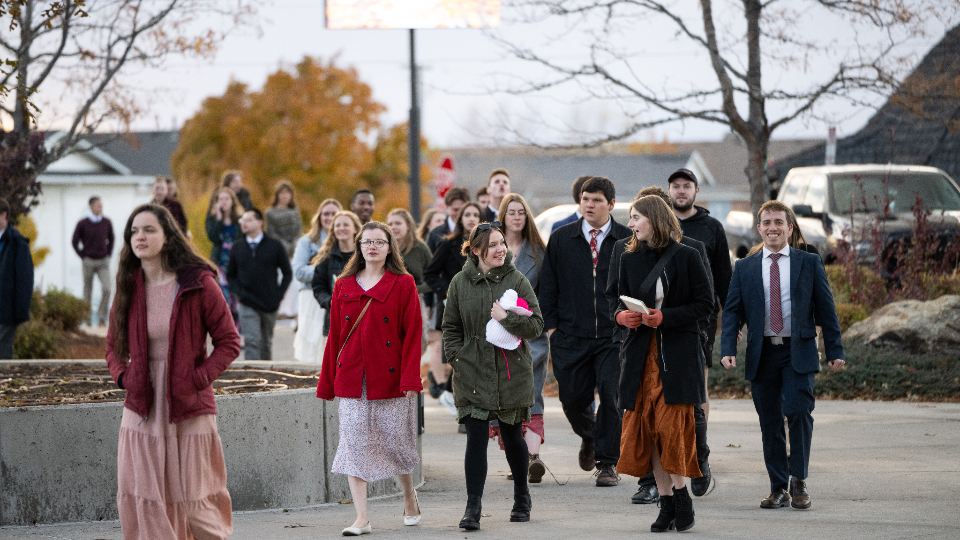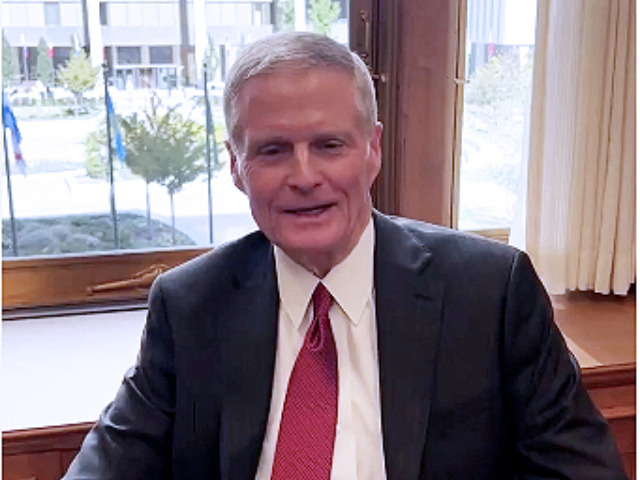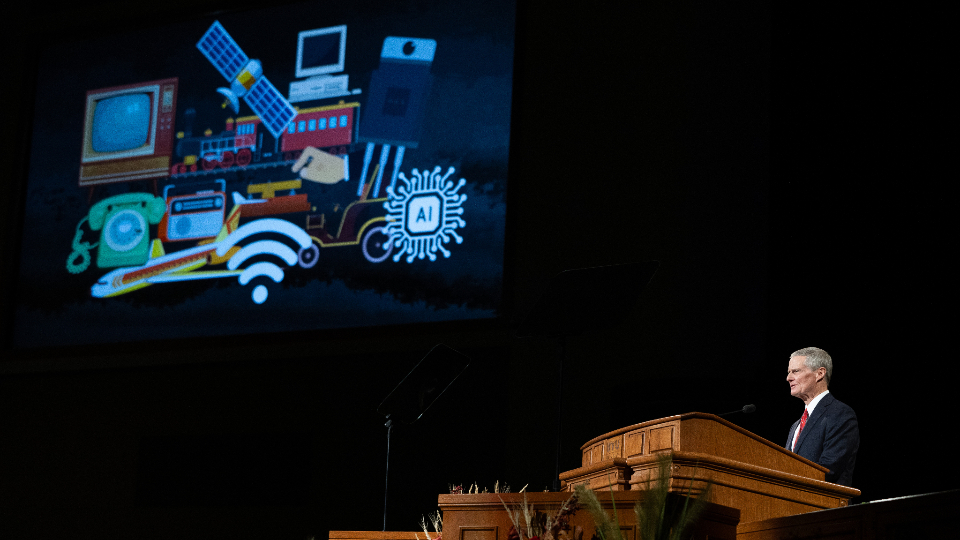
Bednar_Worldwide_Devo_1.jpg
Elder David A. Bednar of the Quorum of the Twelve Apostles speaks at a worldwide devotional for young adults from Brigham Young University–Idaho on Sunday, November 3, 2024. Photo courtesy of BYU–Idaho.All rights reserved.
See also: Principles for Church Use of Artificial Intelligence
On May 3, 2009, Elder David A. Bednar of the Quorum of the Twelve Apostles delivered a speech from Brigham Young University–Idaho, titled “Things as They Really Are.” He said then, “I raise an apostolic voice of warning about the potentially stifling, suffocating, suppressing, and constraining impact of some kinds of cyberspace interactions and experiences upon our souls.”
Fifteen years later, during a Worldwide Devotional for Young Adults on Sunday, November 3, 2024, Elder Bednar shared “Things as They Really Are 2.0” from the same campus in Rexburg, Idaho, offering apostolic guidance for living the gospel in a new technological context.
View the broadcast now.
He reminded listeners that “neither digital innovations nor rapid change in and of themselves are good or evil,” but must be placed in their proper context of the eternal plan of happiness.
Each innovation has potential for both “limitless perils and untold possibilities,” Elder Bednar said, quoting President David O. McKay.
He then posed the same two questions to young adults that he addressed in his original speech:
- Does the use of various technologies and media invite or impede the constant companionship of the Holy Ghost in your life?
- Does the time you spend using various technologies and media enlarge or restrict your capacity to live, to love, and to serve in meaningful ways?
Artificial Intelligence
One technological tool that has emerged since Elder Bednar’s original speech is artificial intelligence (AI).
AI, meant to simulate human intelligence and problem-solving abilities, has “the potential of advancing knowledge, improving our quality of life, facilitating communication and connection, enhancing personal learning and growth, and fostering creativity and innovation.”
Said Elder Bednar: “AI also has the potential to obscure our true identity as sons and daughters of a loving Heavenly Father, distract us from the eternal truths and righteous work necessary for spiritual growth, engender pride and a diminished acknowledgment of our dependence upon God, and distort or replace meaningful human interaction.
“It is a set of computer equations that will treat you as an object to be acted upon, if you let it,” he warned. “Please do not let this technology entice you to become an object.”
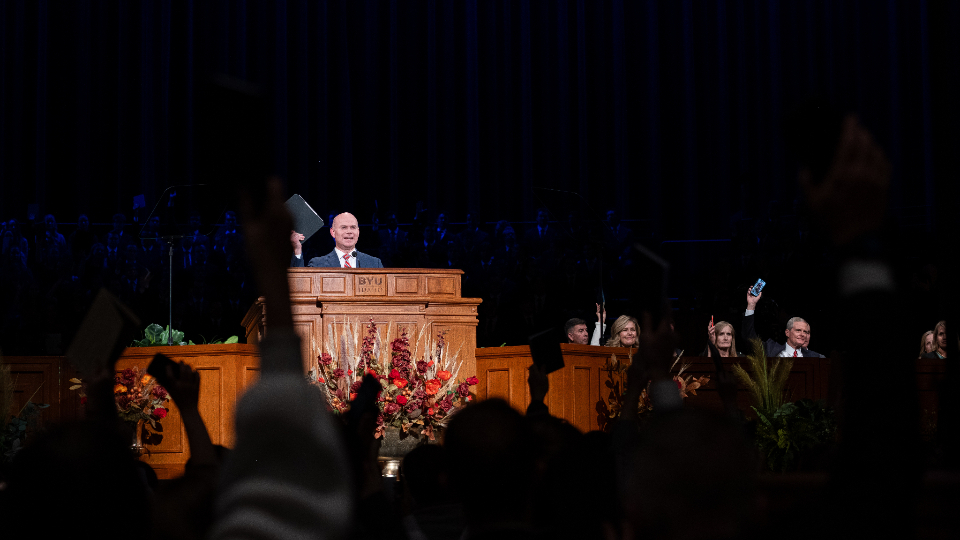
Bednar_Worldwide_Devo_6.jpg
BYU–Idaho President Alvin F. Meredith III instructs attendees to hold up their devices to show they are ready to be taught. This tradition was started by Elder David A. Bednar of the Quorum of the Twelve Apostles when he was president of the university. Photo courtesy of BYU–Idaho.All rights reserved.Elder Bednar encouraged Latter-day Saints to do two things as they navigate the intersection of spirituality and technology:
- Identify gospel principles that can guide their use of artificial intelligence.
- Strive sincerely for the companionship of the Holy Ghost and the spiritual gift of revelation.
Elder Bednar also invited listeners to review the document “Principles for Church Use of Artificial Intelligence,” distributed by the Church earlier this year.
The principles within can “provide a strong foundation upon which you can build your personal safeguards against the perils of inappropriate technology usage,” Elder Bednar said.
Moral Agency
One of Elder Bednar’s key warnings was related to moral agency, “the ability and privilege to choose and to act for ourselves in ways that are good, honest, virtuous and honorable.”
“The fundamental purposes for the exercise of agency are to love one another and to choose God,” Elder Bednar said. “The very purpose of the Creation and of our mortal existence is to see if you and I will choose and act to become what the Lord invites us to become.”
However, misuse of artificial intelligence technologies can have a detrimental effect on our moral agency, causing us to become “objects to be acted upon.”
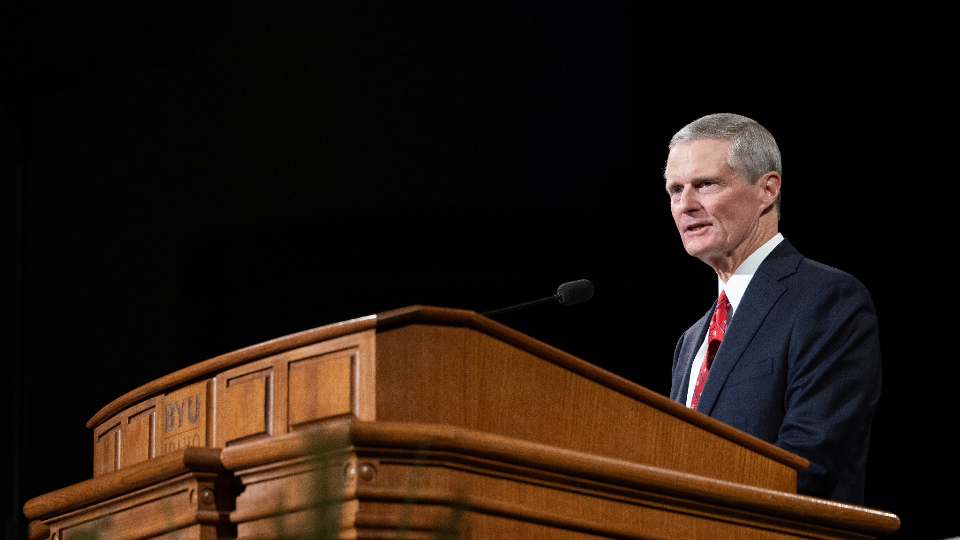
Bednar_Worldwide_Devo_3.jpg
Elder David A. Bednar of the Quorum of the Twelve Apostles speaks at a worldwide devotional for young adults from Brigham Young University–Idaho on Sunday, November 3, 2024. Photo courtesy of BYU–Idaho.All rights reserved.Elder Bednar echoed President Russell M. Nelson’s invitation to “think celestial,” warning that AI only has the ability to “think telestial.”
“No matter how sophisticated and elegant AI technology ultimately may become, it simply can never bear witness of the Father and the Son, reveal the truth of all things, or sanctify those who have repented and become baptized,” Elder Bednar taught.
“As we are wise, preserve and exercise our moral agency to love God and serve our brothers and sisters, and take the Holy Spirit for our guide, we can avoid deception and prosper spiritually in the challenging and blessed times in which we live,” he said.
Righteous Work
The origin of this talk, Elder Bednar said, came from a devotional he delivered in January 2024 titled “Consider the Wondrous Works of God.” There he described the importance of work in our spiritual progress.
Work fulfills the “overarching purpose of Heavenly Father’s plan,” which is “to provide His spirit children with opportunities to learn,” Elder Bednar said in that devotional.
He echoed that message here, telling young adults that “the divine capacities to create and work belong uniquely to each of us as sons and daughters of God.” He warned, however, that “overreliance on AI technology will cause us to become spiritually slothful and shallow.”
As an example, Elder Bednar pointed to the ease of using AI to generate a sacrament meeting talk or Sunday School lesson, bypassing an opportunity to grow spiritually through righteous work.
“The objective is not merely producing or presenting impressive content,” he said. “Rather, it is working and becoming what God intends and yearns for us to become.”
Through focused, sustained and righteous work, Latter-day Saints can become more devoted disciples, receive personal revelation, and strengthen their ongoing conversion to the Lord.
At the end of the devotional, Elder Bednar reiterated the importance of living in a way that invites the Holy Ghost into our lives.
“I bless and promise you to know that as we look unto the Savior in every thought and seek for the companionship of the Holy Ghost, we will be blessed to walk in the meekness of the Lord’s spirit and have peace in Him,” he said. “And we will ‘doubt not, fear not,’ and discern the truth of all things, even things as they really are.”
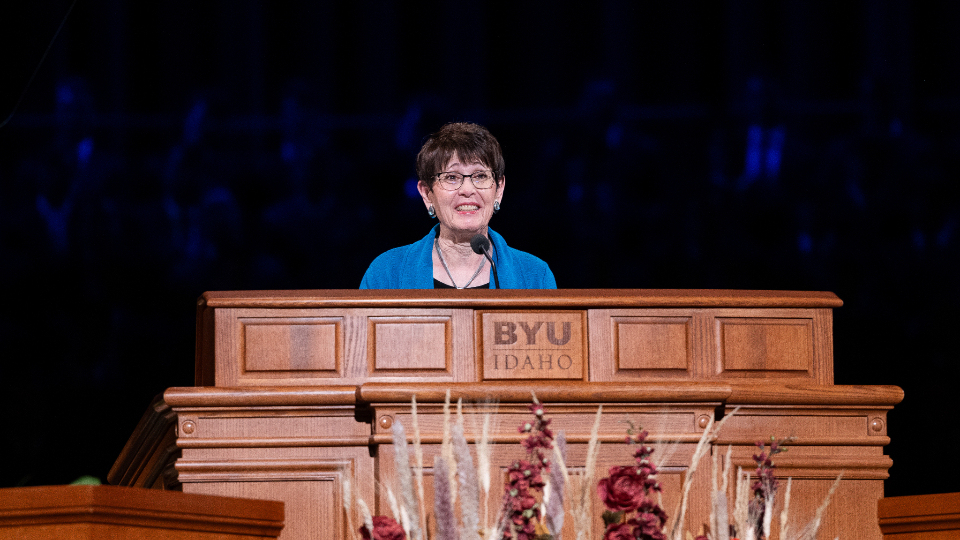
Bednar_Worldwide_Devo_2.jpg
Susan Bednar, wife of Elder David A. Bednar of the Quorum of the Twelve Apostles, speaks at a worldwide devotional for young adults from Brigham Young University–Idaho on Sunday, November 3, 2024. Photo courtesy of BYU–Idaho.All rights reserved.Replacing Fear with Faith
Elder Bednar’s wife, Susan, focused her remarks on overcoming fear through Jesus Christ, addressing three questions submitted by young adults in a previous devotional:
- How can I replace fear with Christlike love and faith?
- How can I stay strong when I feel so weak?
- How can I learn to trust God?
She drew from her own personal experience and scriptural insights in answering these questions, especially Isaiah 41:10.
“Fear thou not; for I am with thee: be not dismayed,” reads the beginning of the verse. Sister Bednar pointed to the account in Luke 24 of the resurrected Savior walking with the disciples on the road to Emmaus.
“I believe Jesus walks with you and me on our journey through life more than we will ever know,” she said. “He is with us.”
Addressing the next part of the verse, “For I am thy God: I will strengthen thee; yea, I will help thee,” Sister Bednar shared a personal experience of driving to the hospital in Salt Lake City to be with her cousin, whose husband had undergone open heart surgery.
There, witnessing her cousin’s husband undergo a blood transfusion drop by drop, she was reminded of the drops of blood the Savior shed for her.
“Somehow, and in a way that I do not fully understand or comprehend, Jesus Christ’s atoning sacrifice gives us strength and help to do hard things. We are blessed to do things we don’t think we can do,” she said.
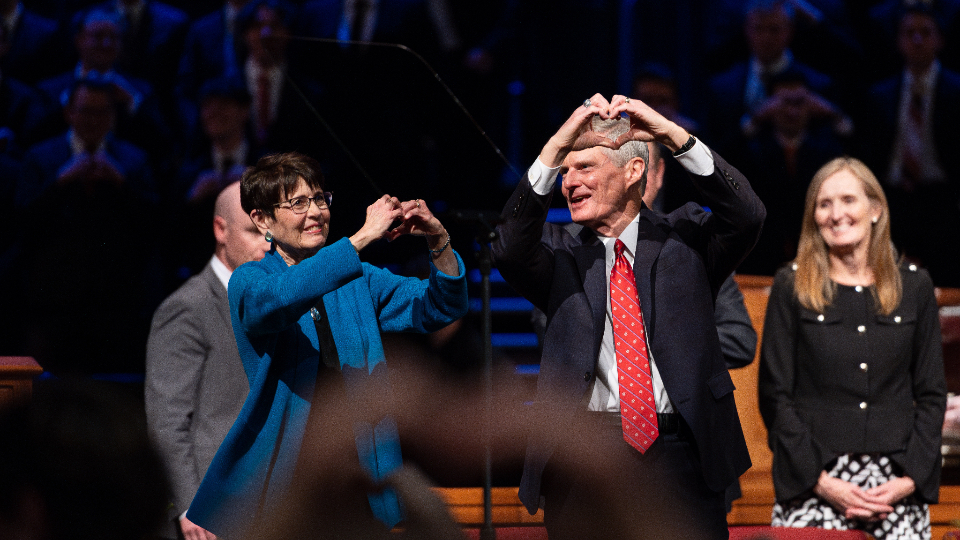
Bednar_Worldwide_Devo_5.jpg
Elder David A. Bednar of the Quorum of the Twelve Apostles and his wife, Susan, greet young adults at the close of a worldwide devotional on Sunday, November 3, 2024. Photo courtesy of BYU–Idaho.All rights reserved.“I will uphold thee with the right hand of my righteousness,” the final part of Isaiah 41:10 reads. Sister Bednar explained that “the right hand is known as the covenant hand.”
Sister Bednar related the scripture to the account of Jesus walking on the water. Peter desiring to join him outside the boat. When Peter loses his focus on the Savior, he begins to sink and cries out for Jesus to save him. “And immediately Jesus stretched forth his hand, and caught him…”
“And I truly believe that he will catch us, too,” she said.
She testified, “He walks with us, he strengthens us, He helps us. And we can trust that He will uphold, sustain, and support us as we remember our covenant connection with Him.”
